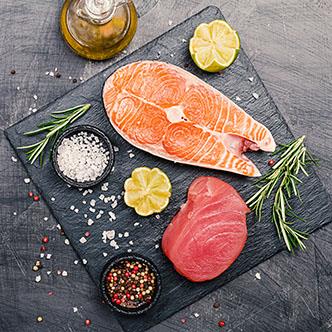
A recent advisory from the American Heart Association adds to existing guidelines on the heart-health benefits of omega-3 fatty acids.
Published in the journal Circulation, this statement focused specifically on the benefits of seafood consumption in an effort to provide clear recommendations for a heart-healthy diet.
Omega-3 fatty acids, formally known as n-3 polyunsaturated fatty acids, are healthy fats naturally contained in certain foods like flaxseed and fish. They’re believed to have a protective effect on heart health and are currently recommended to reduce risk for heart disease.
But how much seafood should be consuming to achieve those heart-health benefits?
According to the latest statement, experts recommend consuming seafood at least one to two times a week—especially species that are high in omega-3 fatty acids, like salmon and tuna. Evidence has linked 1–2 servings of seafood a week to reduced risk of heart disease, stroke and death. The benefits could be especially promising in individuals who replace unhealthy foods with heart-healthy seafood, thus improving their overall diet.
Authors note that consuming more than two servings of seafood a week does not appear to have any benefit or harm. The impact of seafood consumption on risk for heart failure and high blood pressure is unclear, largely due to a lack of evidence.
Experts also clarify that not all seafood is considered equal. According to authors, cold-water oily fish like salmon and tuna have the highest levels of omega-3 fatty acids, while shrimp, lobster, scallops, tilapia and cod contain lower levels of the healthy fat. So when possible, it’s important to choose seafood that is rich in omega-3 fatty acids to achieve the greatest health benefits.
Currently, the American Heart Association recommends consuming 250 mg/day of omega-3 fatty acids, which is usually covered by eating 1–2 servings of fish a week.
As authors explain, seafood is an essential part of any heart-healthy diet and can help significantly lower risk of heart disease—the leading killer of Americans.